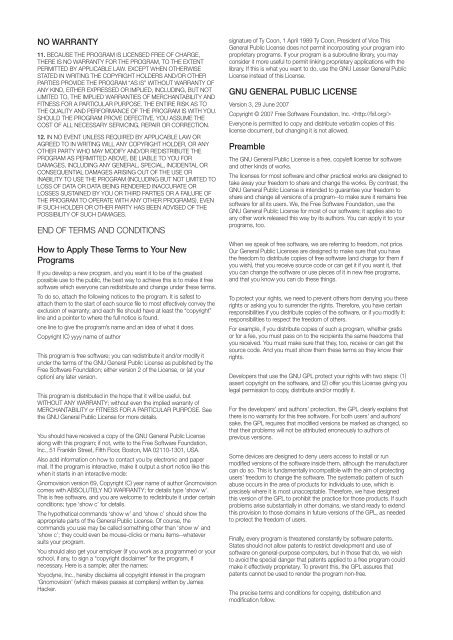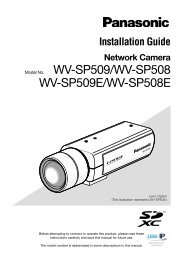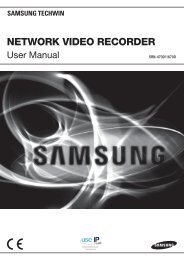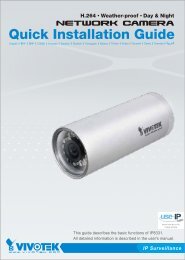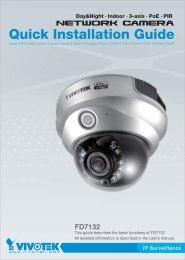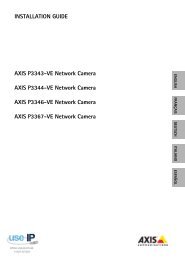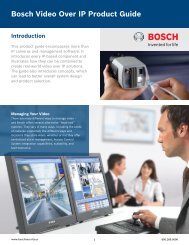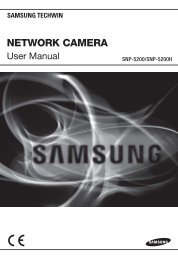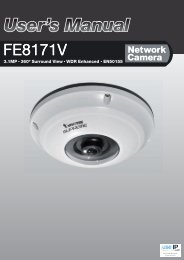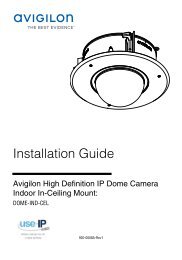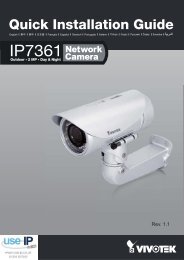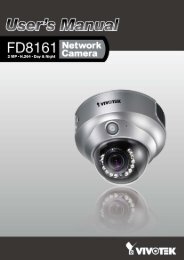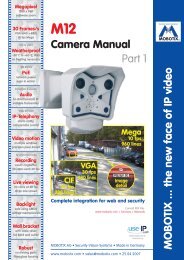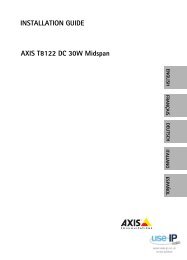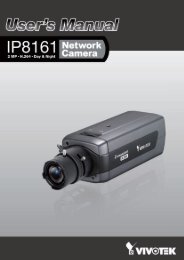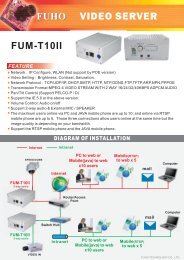Samsung SRN-1000 Network Video Recorder User Manual - Use-IP
Samsung SRN-1000 Network Video Recorder User Manual - Use-IP
Samsung SRN-1000 Network Video Recorder User Manual - Use-IP
You also want an ePaper? Increase the reach of your titles
YUMPU automatically turns print PDFs into web optimized ePapers that Google loves.
NO WARRANTY<br />
11. BECAUSE THE PROGRAM IS LICENSED FREE OF CHARGE,<br />
THERE IS NO WARRANTY FOR THE PROGRAM, TO THE EXTENT<br />
PERMITTED BY APPLICABLE LAW. EXCEPT WHEN OTHERWISE<br />
STATED IN WRITING THE COPYRIGHT HOLDERS AND/OR OTHER<br />
PARTIES PROVIDE THE PROGRAM “AS IS” WITHOUT WARRANTY OF<br />
ANY KIND, EITHER EXPRESSED OR IMPLIED, INCLUDING, BUT NOT<br />
LIMITED TO, THE IMPLIED WARRANTIES OF MERCHANTABILITY AND<br />
FITNESS FOR A PARTICULAR PURPOSE. THE ENTIRE RISK AS TO<br />
THE QUALITY AND PERFORMANCE OF THE PROGRAM IS WITH YOU.<br />
SHOULD THE PROGRAM PROVE DEFECTIVE, YOU ASSUME THE<br />
COST OF ALL NECESSARY SERVICING, REPAIR OR CORRECTION.<br />
12. IN NO EVENT UNLESS REQUIRED BY APPLICABLE LAW OR<br />
AGREED TO IN WRITING WILL ANY COPYRIGHT HOLDER, OR ANY<br />
OTHER PARTY WHO MAY MODIFY AND/OR REDISTRIBUTE THE<br />
PROGRAM AS PERMITTED ABOVE, BE LIABLE TO YOU FOR<br />
DAMAGES, INCLUDING ANY GENERAL, SPECIAL, INCIDENTAL OR<br />
CONSEQUENTIAL DAMAGES ARISING OUT OF THE USE OR<br />
INABILITY TO USE THE PROGRAM (INCLUDING BUT NOT LIMITED TO<br />
LOSS OF DATA OR DATA BEING RENDERED INACCURATE OR<br />
LOSSES SUSTAINED BY YOU OR THIRD PARTIES OR A FAILURE OF<br />
THE PROGRAM TO OPERATE WITH ANY OTHER PROGRAMS), EVEN<br />
IF SUCH HOLDER OR OTHER PARTY HAS BEEN ADVISED OF THE<br />
POSSIBILITY OF SUCH DAMAGES.<br />
END OF TERMS AND CONDITIONS<br />
How to Apply These Terms to Your New<br />
Programs<br />
If you develop a new program, and you want it to be of the greatest<br />
possible use to the public, the best way to achieve this is to make it free<br />
software which everyone can redistribute and change under these terms.<br />
To do so, attach the following notices to the program. It is safest to<br />
attach them to the start of each source file to most effectively convey the<br />
exclusion of warranty; and each file should have at least the “copyright”<br />
line and a pointer to where the full notice is found.<br />
one line to give the program’s name and an idea of what it does.<br />
Copyright (C) yyyy name of author<br />
This program is free software; you can redistribute it and/or modify it<br />
under the terms of the GNU General Public License as published by the<br />
Free Software Foundation; either version 2 of the License, or (at your<br />
option) any later version.<br />
This program is distributed in the hope that it will be useful, but<br />
WITHOUT ANY WARRANTY; without even the implied warranty of<br />
MERCHANTABILITY or FITNESS FOR A PARTICULAR PURPOSE. See<br />
the GNU General Public License for more details.<br />
You should have received a copy of the GNU General Public License<br />
along with this program; if not, write to the Free Software Foundation,<br />
Inc., 51 Franklin Street, Fifth Floor, Boston, MA 02110-1301, USA.<br />
Also add information on how to contact you by electronic and paper<br />
mail. If the program is interactive, make it output a short notice like this<br />
when it starts in an interactive mode:<br />
Gnomovision version 69, Copyright (C) year name of author Gnomovision<br />
comes with ABSOLUTELY NO WARRANTY; for details type ‘show w’.<br />
This is free software, and you are welcome to redistribute it under certain<br />
conditions; type ‘show c’ for details.<br />
The hypothetical commands ‘show w’ and ‘show c’ should show the<br />
appropriate parts of the General Public License. Of course, the<br />
commands you use may be called something other than ‘show w’ and<br />
‘show c’; they could even be mouse-clicks or menu items--whatever<br />
suits your program.<br />
You should also get your employer (if you work as a programmer) or your<br />
school, if any, to sign a “copyright disclaimer” for the program, if<br />
necessary. Here is a sample; alter the names:<br />
Yoyodyne, Inc., hereby disclaims all copyright interest in the program<br />
‘Gnomovision’ (which makes passes at compilers) written by James<br />
Hacker.<br />
signature of Ty Coon, 1 April 1989 Ty Coon, President of Vice This<br />
General Public License does not permit incorporating your program into<br />
proprietary programs. If your program is a subroutine library, you may<br />
consider it more useful to permit linking proprietary applications with the<br />
library. If this is what you want to do, use the GNU Lesser General Public<br />
License instead of this License.<br />
GNU GENERAL PUBLIC LICENSE<br />
Version 3, 29 June 2007<br />
Copyright © 2007 Free Software Foundation, Inc. <br />
Everyone is permitted to copy and distribute verbatim copies of this<br />
license document, but changing it is not allowed.<br />
Preamble<br />
The GNU General Public License is a free, copyleft license for software<br />
and other kinds of works.<br />
The licenses for most software and other practical works are designed to<br />
take away your freedom to share and change the works. By contrast, the<br />
GNU General Public License is intended to guarantee your freedom to<br />
share and change all versions of a program--to make sure it remains free<br />
software for all its users. We, the Free Software Foundation, use the<br />
GNU General Public License for most of our software; it applies also to<br />
any other work released this way by its authors. You can apply it to your<br />
programs, too.<br />
When we speak of free software, we are referring to freedom, not price.<br />
Our General Public Licenses are designed to make sure that you have<br />
the freedom to distribute copies of free software (and charge for them if<br />
you wish), that you receive source code or can get it if you want it, that<br />
you can change the software or use pieces of it in new free programs,<br />
and that you know you can do these things.<br />
To protect your rights, we need to prevent others from denying you these<br />
rights or asking you to surrender the rights. Therefore, you have certain<br />
responsibilities if you distribute copies of the software, or if you modify it:<br />
responsibilities to respect the freedom of others.<br />
For example, if you distribute copies of such a program, whether gratis<br />
or for a fee, you must pass on to the recipients the same freedoms that<br />
you received. You must make sure that they, too, receive or can get the<br />
source code. And you must show them these terms so they know their<br />
rights.<br />
Developers that use the GNU GPL protect your rights with two steps: (1)<br />
assert copyright on the software, and (2) offer you this License giving you<br />
legal permission to copy, distribute and/or modify it.<br />
For the developers' and authors' protection, the GPL clearly explains that<br />
there is no warranty for this free software. For both users' and authors'<br />
sake, the GPL requires that modified versions be marked as changed, so<br />
that their problems will not be attributed erroneously to authors of<br />
previous versions.<br />
Some devices are designed to deny users access to install or run<br />
modified versions of the software inside them, although the manufacturer<br />
can do so. This is fundamentally incompatible with the aim of protecting<br />
users' freedom to change the software. The systematic pattern of such<br />
abuse occurs in the area of products for individuals to use, which is<br />
precisely where it is most unacceptable. Therefore, we have designed<br />
this version of the GPL to prohibit the practice for those products. If such<br />
problems arise substantially in other domains, we stand ready to extend<br />
this provision to those domains in future versions of the GPL, as needed<br />
to protect the freedom of users.<br />
Finally, every program is threatened constantly by software patents.<br />
States should not allow patents to restrict development and use of<br />
software on general-purpose computers, but in those that do, we wish<br />
to avoid the special danger that patents applied to a free program could<br />
make it effectively proprietary. To prevent this, the GPL assures that<br />
patents cannot be used to render the program non-free.<br />
The precise terms and conditions for copying, distribution and<br />
modification follow.


